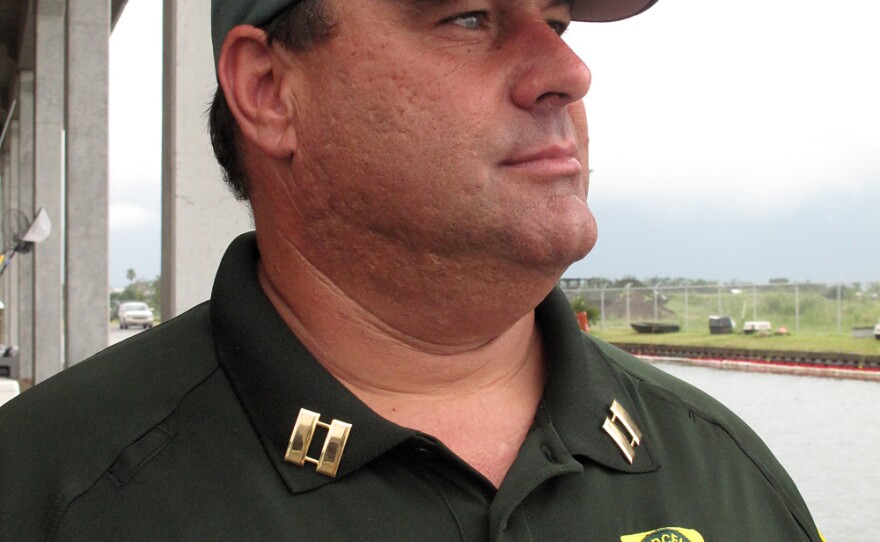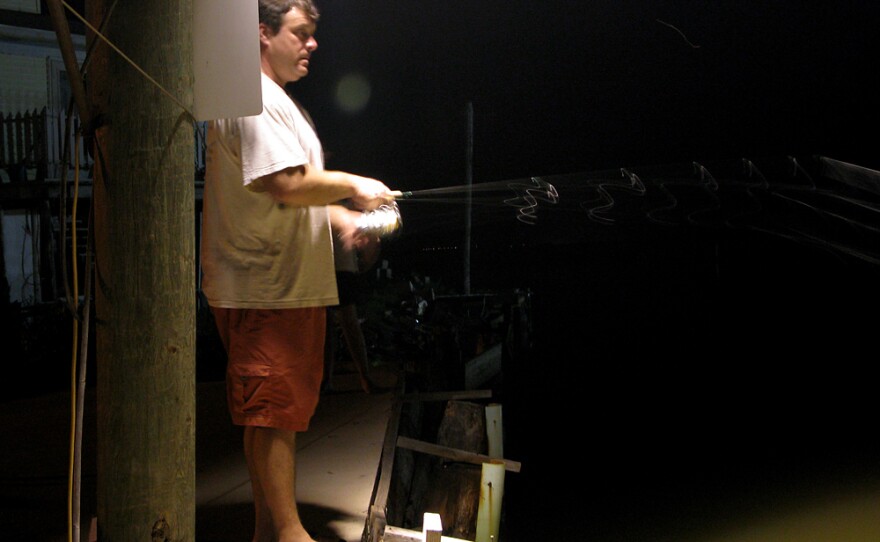The massive Gulf of Mexico oil spill has closed large swaths of the Louisiana coast to fishing. But that doesn't mean the folks there don't fish. When the sun goes down, the illegal rods and nets come out.
I catch my first sight of fishing in banned water just after dusk in Grand Isle, on the southern tip of Louisiana. Bryan Casey and a couple of friends are out behind his RV, fishing poles in hand. They aren't selling anything. They're just having fun. But on the dock are some telltale flopping fish. The guys deny everything.
"We're not fishing," says Brett Fontenot.
"We're collecting," adds Casey.
"Biological research," Fontenot insists -- you know, the kind of research you fry up in butter.
On the Wildlife and Fisheries map of Louisiana, the no-fishing zone looks like someone spilled a glass of red wine all over the coast. And smack dab in the middle of that stain is Grand Isle. It's usually a fisherman's paradise, but these days the rental houses are filled with cleanup workers. The fishing boats are idle, and the beaches are closed.
That leaves locals like Fontenot with nothing much to do at night. He came over to visit Casey and check out the midnight fish action.
He hurls a net into the canal that connects the bay and the ocean, pulls it up and pours out the shrimp.
He's been doing this all his life, and he isn't going to stop just because crude oil washed up on the beach a couple hundred yards away.
"See the sheen of the oil on the water," Fontenot points out. He doesn't think it's dangerous. To prove his point, Fontenot grabs a meaty, 4-inch shrimp from the pile. He asks me to shine a light on it.
"This shrimp has no oil on it whatsoever," he says. "It's popping like crazy."
Then he takes a bite.
"Not bad," Fontenot says with his mouth full. "If I start growing a third arm out of my chest tomorrow, you'll know why. Blame BP."
These guys aren't the only people eluding the fishing ban. The Louisiana Wildlife and Fisheries Department says 641 citations have been handed out for illegal fishing since the ban went into effect.
Some are recreational fishers like these buddies. That kind of rule-breaker might just get off with a warning. But most of the citations are for commercial fishermen trying to make a buck during the ban. In their nightly patrols, wildlife agents confiscated 19,300 pounds of shrimp.

The head of enforcement for Grand Isle, Capt. Chuck Comeaux, says the boats go out at night without lights and drop their nets. What they don't know is that the enforcement officers carry night vision goggles.
"We sneak up on them. We're good at that," Comeaux says.
And when the officers turn on their floodlights, Comeaux says, you can see the fishers throwing the illegal catch overboard like "Mardi Gras beads."
But even though the bulk of the arrests are commercial fishermen, there are no loopholes for the little guy. You can't fish from a boat or from the shore. You are guilty even if you catch and release your fish. Even going out with a rod is considered fishing.
The crime of illegal fishing brings a misdemeanor citation with a state fine up to $500 and 90 days in jail.
"We have to make sure the seafood is safe," Comeaux says. "Our reputation in Louisiana is for good fresh seafood, and we don't want to ruin that."
But out in the fishing darkness, it's easy to pretend that everything is still alright on the Louisiana Coast.
Casey says maybe that's why he won't give up recreational fishing.
"We've been doing it for so long, it's hard to tell us to stop," Casey says. "And now it's all been taken away."
Well, not everything: It's a beautiful night, the fridge is filled with beer, and there's still that thrill when you feel the tug of the forbidden fish.
Copyright 2022 NPR. To see more, visit https://www.npr.org. 9(MDAzMjM2NDYzMDEyMzc1Njk5NjAxNzY3OQ001))







